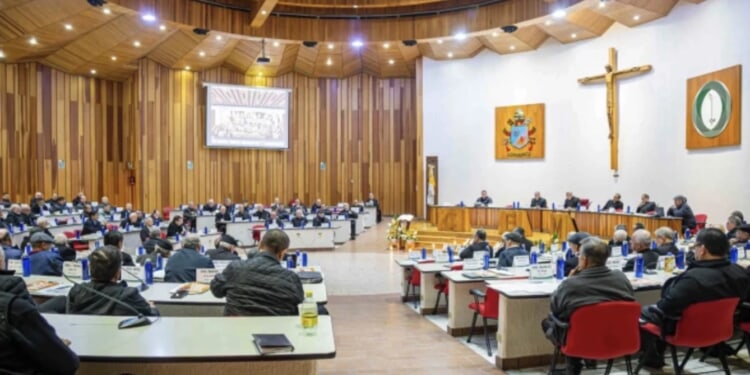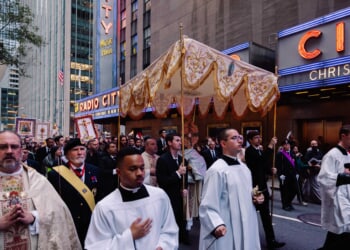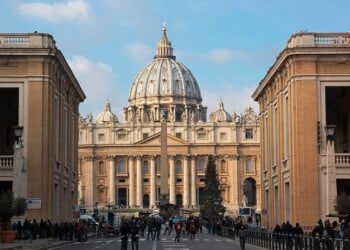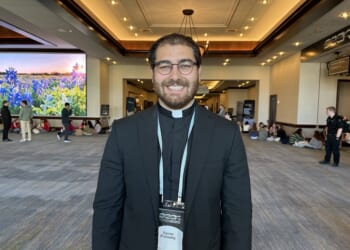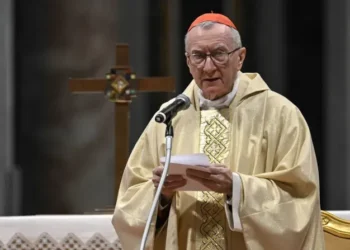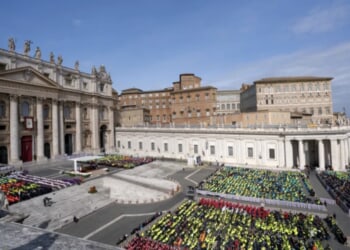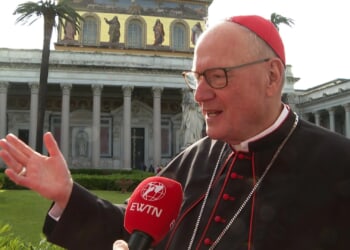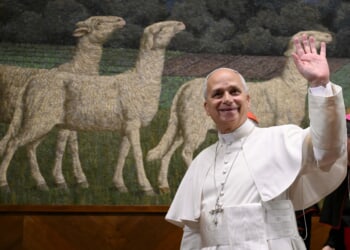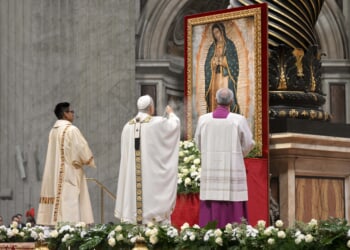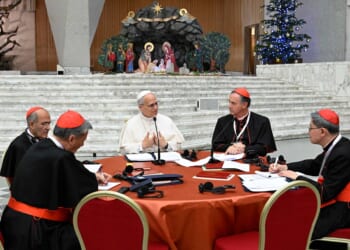Puebla, Mexico, Nov 15, 2025 /
09:00 am
As the centenary of the Calles Law, which precipitated the bloodiest wave of religious persecution against Mexican Catholics, approaches in 2026, the Mexican Bishops’ Conference (CEM, by its Spanish acronym) paid tribute to the more than 200,000 martyrs of the Cristero Resistance, recalling that they said “with their lives what they proclaimed with their lips: Christ is King, not the oppressive state; Christ is King, not the dictator of the day who is wrapped up in his pride.”
The Mexican bishops expressed this sentiment in their message to “the people of God,” titled “Church in Mexico: Memory and Prophecy — Pilgrims of Hope Toward the Centenary of Our Martyrs,” released Nov. 13.
The message is a fruit of the 119th plenary assembly of the Mexican Bishops’ Conference held Nov. 10–14, which brought together 121 bishops at Casa Lago in Mexico state.
The bishops recalled that “just a few months after the proclamation of the solemnity of Christ the King, in July 1926, the so-called ‘Calles Law’ came into effect in our country, unleashing the most brutal religious persecution in our history. This is why, in January 1927, the repressed Catholic population began the armed uprising known as the Cristero Resistance.”
“A coincidence? No, brothers: a providential event,” the bishops affirmed.
Persecution of Catholics in Mexico
The CEM referred to the legislation officially known as the “Law on Crimes and Offenses Related to Religious Worship and External Discipline,” enacted by then-President Plutarco Elías Calles. This law, which brought to a critical point the severe restrictions imposed on the Church by the 1917 Constitution, established strict control over believers and ministers of religion under penalty of fines and imprisonment.
Among other provisions, the Calles Law, which came into effect on July 31, 1926, dissolved “monastic orders or convents,” severely restricted the pastoral work of priests, prohibited foreign priests from ministering in the country, forbade public worship “outside the church premises” and expropriated any building “constructed or intended for the administration, promotion, or teaching of a religion,” which was to pass “into the direct ownership of the nation.”
The Cristero War, as the conflict between Catholics and the secularist government of Calles became known, officially ended in June 1929, although the persecution and murdering of believers continued. Relations between Church and state would not be reestablished until 1992, when an amendment to the 1917 Constitution and the Law on Religious Associations and Public Worship recognized the legal existence of the Catholic Church.
Are we accustomed to ‘relegating faith to the private sphere’?
The Mexican bishops noted that “when the totalitarian state attempted to impose its absolute dominion over consciences, our martyrs understood with crystal clarity the centrality of Jesus Christ: To die shouting ‘Long live Christ the King!’ was to affirm that no human power can claim absolute sovereignty over a person and his conscience.”
“Today we wish to honor the memory of the more than 200,000 martyrs who gave their lives defending their faith: children, young people, the elderly; farmers, laborers, professionals; priests, religious, and laypeople; the heroic Mexico of the Cristeros who gave their lives for a sacred cause, for the freedom to believe and to live according to their faith — all of them wrote a luminous page in the history of the universal Church and of our homeland.”
For the CEM, “the centenary of 2026 cannot be a mere nostalgic commemoration. It must be an examination of conscience and a renewed commitment. Our martyrs ask us today: Are we willing to defend our faith with the same radicalism? Have we lost our sense of the sacred? Have we accommodated ourselves to a culture that seeks to relegate faith to the private sphere?”
Pope Leo XIV’s call to unity
The Mexican bishops also noted Pope Leo XIV’s repeated call for unity in the Church, emphasizing that his words “challenge us because we know that unity among us is not a guaranteed fact but a grace that we must receive and cultivate each day with humility and fraternal charity.”
“And we want you to know, brothers and sisters, that this unity among us is to better serve the unity of all the people of God,” they stated.
(Story continues below)
Subscribe to our daily newsletter
“We live in a country that longs for peace and needs credible witnesses of reconciliation. And we want you to know, brothers and sisters, that we want to give this witness together: pastors and people, walking together in Christ,” they added.
500th anniversary of Guadalupe event
The CEM also referred to the upcoming celebration in 2031 of the 500th anniversary of the apparitions of Our Lady of Guadalupe in Mexico, emphasizing that “Guadalupe is a remembrance of reconciliation.”
“In the 16th century, when two such different worlds met in these lands, Mary appeared at Tepeyac as a bridge between cultures and races, as a mother who welcomed all her children without distinction. Guadalupe teaches us that unity is not built by erasing differences but by recognizing the image of God in every face,” the conference stated.
“Guadalupe has, at another point in history, inspired our people’s yearning for freedom. Today, it must also be a sign of strength to liberate ourselves from violence, poverty, and injustice,” they stated.
Migration and violence, ‘realities we cannot remain silent about’
The bishops then clarified that their words were not “political or partisan,” explaining that they could not “be indifferent to the suffering of our people. We cannot remain neutral when human dignity is at stake.”
“Our nation remains under the control of the violent,” they decried. “We are living through difficult times; violence has become commonplace. This cancer of organized crime, which we have suffered for years, has spread its tentacles to many corners of the country. None of the leaders who have governed this country have managed to eradicate this evil.”
However, they emphasized, “we must not be afraid to speak about what we all know but some prefer to keep silent about.”
At the same time, they noted that “forced migration continues. Thousands of Mexicans are forced to leave their homeland, not only in search of better opportunities, but also to flee violence. And those who migrate encounter new forms of violence along the way.”
“Thousands of our Central American brothers and sisters, and those from other continents, cross through our territory, victims of extortion, kidnapping, trafficking, and death,” they charged.
Defending the family
The Mexican bishops also warned that “this whole worrying reality begins in the family: a society that does not protect the family leaves itself unprotected.” The prelates lamented the “alarming” data that show a scenario of “disintegrated families, domestic violence and violence in school environments, and addictions that destroy the lives of young people.
The bishops then criticized public policies implemented “without genuine dialogue with parents and other stakeholders in education,” while “a subtle, and sometimes explicit, anthropological vision alien to the integral dignity of the human person is promoted.”
Recalling the witness of the martyrs, within the context of the Jubilee Year of Hope that is now ending, the bishops affirmed that “Christian hope does not consist in closing our eyes to evil, but in keeping them open, recognizing that Christ has conquered evil with good. Only by acknowledging our errors can we correct them.”
This story was first published by ACI Prensa, CNA’s Spanish-language news partner. It has been translated and adapted by CNA.

